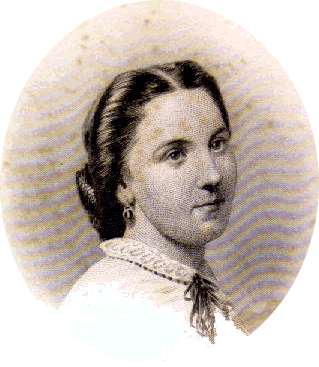Fanny Lawrence Rickets lived by these words from Ruth 1:16. Neither enemy lines, blood and gore, or prison walls could stop her from being by her husband’s side when he needed her.
Fanny married the love of her life, Captain James Rickets, in January 1856. The young bride soon thereafter joined her husband on the Texas frontier where his artillery company was stationed. She shared in the hardships of garrison life even as she brought cheer to the men and aided the sick.
When the Civil War erupted, she moved with James to his new post in the Washington, D.C. area, and that is where she awaited news of him when he fought in the Battle of First Manassas on July 21, 1861.
Reports came back that he had perished on the battlefield. An aide even brought James’s sword and last words to Fanny. For two days, she endured the belief that she had lost her beloved husband, but then word came, that although he was grievously wounded, he was still alive and a prisoner of the Confederates.
Fanny immediately took action. She procured a carriage, two horses, and a pass from the Federal Army in order to travel through the lines to her husband, and set out on her own. However, the pass meant nothing once she reached the Confederate pickets, but Fanny persevered. She sent a note to Confederate Colonel J.E.B. Stuart, an old army friend of her husband’s. Stuart agreed to allow her to travel to Manassas, if she’d sign a note swearing that she wasn’t there to spy. Fanny ripped up the note in front of him and said, “I am no spy, but the wife of a wounded officer, and I will go as your prisoner, but I will never sign this.”
Stuart reluctantly agreed and sent her on her way to the battlefield. Fanny found James at the Lewis House, a.k.a. as Portici, still covered in blood five days after the battle:
“No words can describe the horrors around me. Two men dead and covered with blood were carried down the stairs as I waited to let them pass. On a table in the open hall, a man was undergoing amputation of the leg. At the foot of the stairs two bloody legs lay, and through it all I went to my husband. Outside the next door was a severed arm, and my clothes brushed by blood, cloths, splint, etc. I found my dear husband lying on a hospital stretcher, still covered with blood! Downstairs, there are some forty men in the various stages of death or possible recovery. Blood runs on the floors, the smell is dreadful but no language can describe it. ” Mrs. Fanny Captain Ricketts, 1861
Forsaking her own comfort, Fanny dug in and got to work caring for James, who’d been shot four times, and for the other men in the ward. Two weeks later, the Confederates transferred Rickets, who still wavered between life and death, to a prison in Richmond. Fanny was not about to let her husband go without her. She followed him to prison and slept by his bed for four months, nursing him and the other wounded officers, in a doorless room where they were gawked at by curious onlookers.
Fanny’s love for her husband meant more to her than her own comfort and safety. Her courage and determination enabled her to put her love into the action even in the most dire circumstances. Her sacrifices and ministrations helped save his life.
In December 1861, Ricketts was traded in a prisoner exchange and allowed to return home to finish his recovery. The ever-faithful Fanny followed.
However, the war was not over. Ricketts rose to the rank of general and was seriously wounded two more times, and his wife saw him through it all.
Sources:
Bitakofer, Sheritta. “The Bravery of Fanny Ricketts.” Belle on the Battlefield. 5 June 2019. https://belleonthebattlefield.wordpress.com/2019/06/05/the-bravery-of-fanny-ricketts/
“Fanny and Her Captain, A Thousand Words Worth One Photograph.” Civil War Talk. 16 Nov 2017. https://civilwartalk.com/threads/fanny-and-her-captain-a-thousand-words-worth-one-photograph.140442/
“Fanny Lawrence Ricketts.” History of American Women. Women’s History Blog. https://www.womenhistoryblog.com/2008/06/fannie-lawrence-ricketts.html


Thank you so much for sharing this story of faithfulness and courage!
Thank you, Dave! I’m glad you enjoyed it.
This is a beautiful story.
Yes, I admire her devotion, courage, and determination. I first heard this story when I visited the Manassas Battlefied this summer, and I’m excited to be able to share it.
Love this story! A testament of love!
I’m glad you enjoyed it! It’s a love story worth sharing.